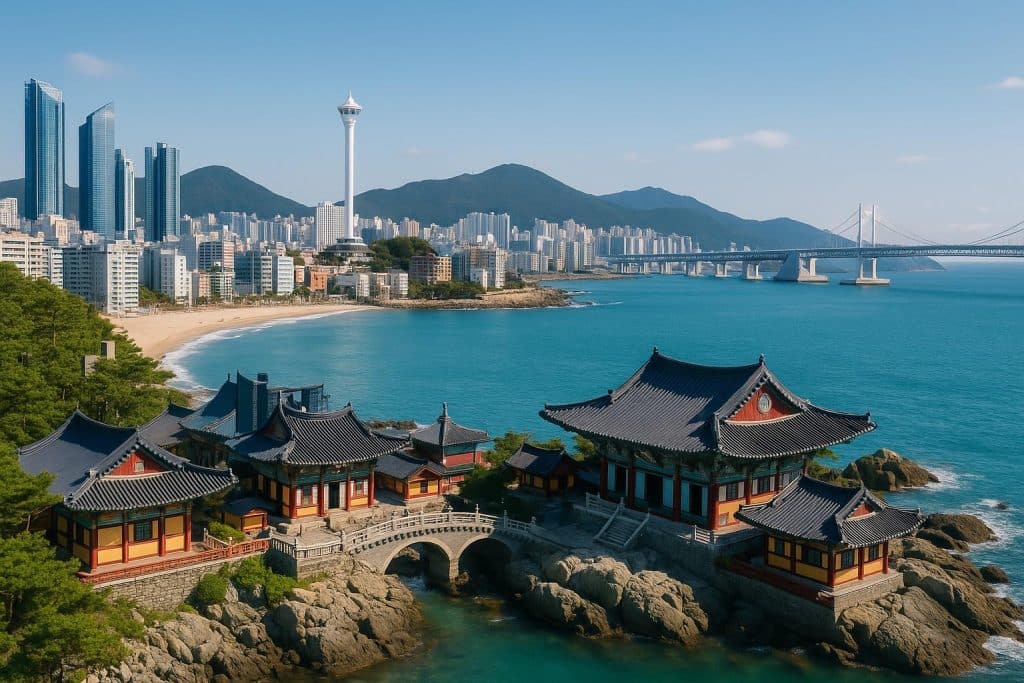Busan, South Korea’s second-largest city, is more than just a seaside destination. It is a vibrant metropolis where skyscrapers stand beside sandy beaches, where colorful hillside villages draw photographers, and where seafood markets come alive at dawn with the voices of vendors. This extended guide is designed to give travelers a deeper understanding of Busan’s character, and to show why it deserves several days of exploration rather than a quick stopover.
Local Knowledge
A successful trip begins with reliable local insight. While guidebooks offer the basics, nothing replaces the value of a community-driven hub like 부산 커뮤니티 바로가기. This space allows travelers to access timely tips, local restaurant updates, changes in operating hours, and recommendations that often remain hidden from mainstream sources. For those planning complex itineraries, it provides reassurance and reduces the risk of wasting time searching for outdated information.
Gwangalli Beach and the Gwangan Bridge
Gwangalli Beach stands out not only for its clean shoreline but also for its unique connection to Gwangan Bridge, a structure that lights up in a choreographed display each evening. Visitors often divide their time between relaxing on the sand, sampling desserts from nearby cafés, and taking long-exposure photos of the bridge after sunset. The mood here changes from a family-friendly daytime escape to a lively night scene filled with music and conversation. For detailed tips on where to capture the best photos, or which waterfront cafés offer the most striking views, check 부산 광안리 정보.
Gwangalli is also known for seasonal festivals such as fireworks displays that light up the entire bay. These events attract huge crowds, so arriving early is essential. The beach itself is lined with restaurants offering everything from grilled shellfish to fusion cuisine, ensuring that even long evenings by the water never lack variety.
Haeundae Beach
Haeundae is perhaps the most internationally recognized part of Busan. Its broad expanse of sand welcomes visitors in every season, though summer is when it bursts into full life. The boardwalk offers open views, while the adjacent traditional market delivers the flavors of the city through street snacks and fresh catches. Cafés and boutique hotels line the streets nearby, creating a neighborhood that balances convenience with charm.
The Blue Line Park capsules provide an elevated view of the coast, and Dongbaekseom Island allows for peaceful morning walks surrounded by camellia trees. Many visitors find that staying in Haeundae gives them an ideal base, combining nightlife with easy access to public transportation and neighboring attractions.
Gamcheon Culture Village
Known as the “Machu Picchu of Busan,” Gamcheon Culture Village is a masterpiece of community art. Houses climb the hillside in bright pastel shades, while stairways carry murals, sculptures, and art projects created by residents and local artists. Exploring Gamcheon is a sensory experience — colorful visuals, the aroma of coffee from tiny cafés, and the sound of visitors discovering hidden alleys.
Gamcheon’s popularity means afternoons are often crowded, so early visits are recommended. Maps available at the entrance suggest routes that highlight both main artworks and quieter corners. From certain lookouts, the entire village cascades down toward the harbor, creating photo opportunities that define many travelers’ memories of Busan.
Jagalchi Fish Market
Jagalchi is not only Korea’s largest seafood market but also a cultural institution. Arriving in the morning reveals the market at its busiest, with fresh catches being arranged in displays and restaurant owners negotiating prices. Tourists are welcome to choose fish directly from vendors and then enjoy it prepared upstairs, either raw or cooked. The experience is direct, authentic, and memorable.
Beyond eating, walking the market’s aisles offers a look into Busan’s maritime identity. The market illustrates the city’s dependence on the sea, both economically and culturally. Photographers will find the mix of colors, textures, and activity irresistible.
Temples and Trails
For moments of reflection, Busan’s temples provide tranquility. Beomeosa Temple rests in the mountains, surrounded by forest trails that reveal stone gates and wooden pagodas. Yonggungsa Temple, uniquely perched by the sea, delivers breathtaking sunrises and crashing waves beneath its platforms. Visiting these temples balances the city’s urban pulse with quiet spiritual rhythm.
Trails like Igidae Coastal Walk further enrich the experience, offering dramatic cliffs, suspension bridges, and tidal pools. Hikers often find these routes less crowded, allowing for uninterrupted views of the sea and sky.
City Views and Nightlife
For panoramic perspectives, Hwangnyeongsan Mountain provides sweeping views over Busan’s skyline. At sunset, the lights flicker on across the harbor, and the Gwangan Bridge shines as a luminous centerpiece. After dark, neighborhoods like Seomyeon and Nampo-dong come alive with neon signs, karaoke rooms, and endless eateries. The energy here contrasts with the serenity of the temples, reminding visitors of Busan’s diversity.
Seasonal Highlights
Spring delivers cherry blossoms across temple courtyards, summer celebrates with beach festivals, autumn rewards hikers with crisp air and colorful foliage, and winter slows the city down with quiet markets and steaming hot springs. Each season transforms Busan’s atmosphere, ensuring that no two visits feel the same.
Food Culture
While seafood defines Busan, local specialties such as milmyeon (cold wheat noodles) and dwaeji gukbap (pork and rice soup) add variety. Street food is equally rewarding, with hotteok pancakes, skewers, and savory pancakes available across markets and alleys. Exploring these tastes becomes as important as sightseeing itself.
Sample Itinerary
Day 1: Start at Haeundae, lunch in the traditional market, walk Dongbaekseom, and end with sunset at Gwangalli.
Day 2: Explore Gamcheon in the morning, eat fresh seafood at Jagalchi, hike the Igidae Coastal Walk, and capture the skyline from Hwangnyeongsan.
Day 3: Visit Beomeosa Temple, shop in Seomyeon, and close with a street food tour of Nampo-dong.
Conclusion
Busan thrives on contrast: serene temples beside neon skylines, tranquil beaches alongside bustling fish markets, and centuries-old traditions beside cutting-edge cafés. With insights from 부산 커뮤니티 바로가기 and detailed perspectives like those found at 부산 광안리 정보, travelers can design itineraries that are both comprehensive and personal, ensuring every moment in Busan is memorable.
